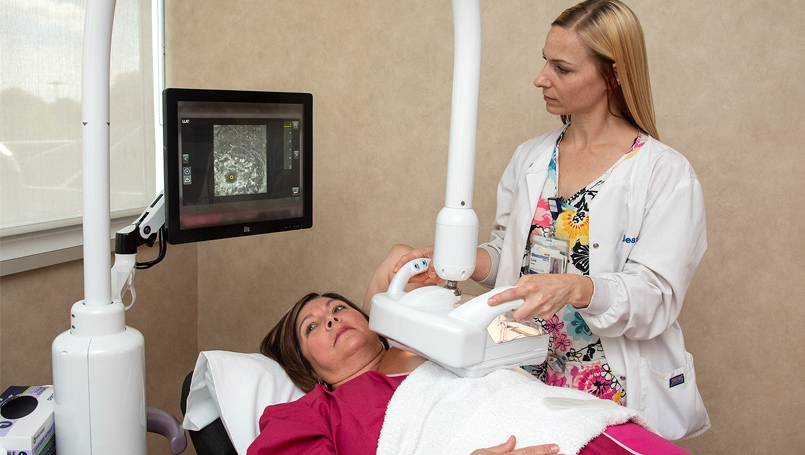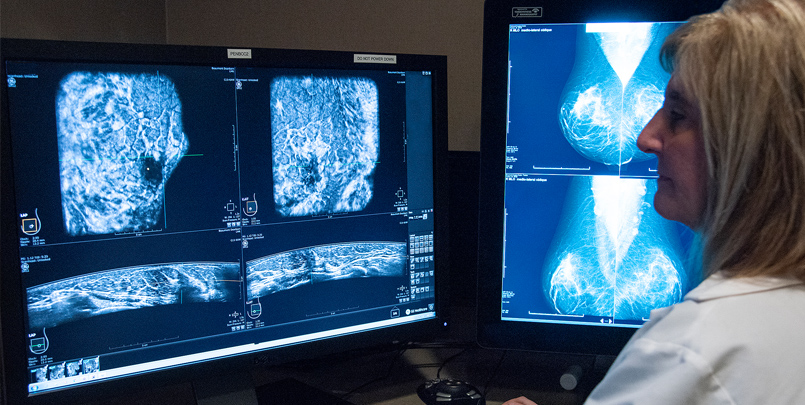Thursday, October 11, 2018

Breast Care Center in Dearborn launches new, advanced imaging technology for women with dense breasts
Technological advances in breast care mean better accuracy for women getting screened for breast cancer, and better precision for women with dense breasts.
Adding to its comprehensive breast cancer screening program, the Beaumont Breast Care Center in Dearborn is the first facility in the nation to install the Invenia Automated Breast Ultrasound (ABUS) 2.0 from GE Healthcare.It is a comfortable, nonionizing alternative to other supplemental screening options for women with dense breast tissue and is the only FDA-approved ultrasound for breast cancer screening.
“We are committed to informing patients about breast density, and offering supplemental screening options,” said Sophia Roumanis, M.D., section head of Breast Imaging and Intervention, Beaumont Breast Care Center, Dearborn. “We are thrilled to add the Invenia ABUS 2.0 to our breast cancer screening program, which allows better visibility of dense breast tissue during breast cancer screenings.”
Approximately 40 percent of women in the U.S. have dense breasts, which are identified by routine screening mammograms.
Dense breast tissue not only increases the risk of breast cancer up to 4-6 times, but also makes cancer more difficult to detect if using mammography alone. Both cancer and dense tissue show up white on a mammogram, so looking for tumors in women with dense breasts can be like looking for a snowball in a snowstorm.

“We believe that automated breast ultrasound has the potential to find significantly more cancers than mammography alone in women with dense breasts,” said Luke Delaney, general manager of Automated Breast Ultrasound at GE Healthcare. “We are continuously improving Invenia ABUS to ensure high image quality, workflow, and overall patient experience – which can all contribute to early detection and improved outcomes.”
“Our goal is to find cancers as early as possible to offer the best potential outcome for the patient,” commented Vidya Pai, M.D., section head of Breast Imaging and Intervention, Beaumont Hospital, Royal Oak. “By offering ABUS in addition to mammography for patients with dense breast tissue, we anticipate improving detection for small cancers that may not be seen on a mammogram alone in these women.”
Mammograms remain the gold standard for detecting breast tumors, according to physicians, but supplemental imaging options will make a significant difference for women with dense breasts.
“Mammograms are the map,” said Dr. Roumanis. “Giving patients more information is better, and supplemental screening by ultrasound is peace of mind for patients. We try to educate women when they come in for their screening mammogram and explain about dense breasts and ultrasound.”
Dr. Pai added, “When breast tissue is more dense, it can mask lesions. Cancers that are detected at an earlier stage are smaller and easier to treat.”
In 2015, Michigan became the 21st state to adapt the breast density legislation, which requires mammography providers to inform patients if they have dense breast tissue on screening mammography.
“We want to empower women to make more informed decisions about their breast health, and encourage them to talk with their physician about advanced screening options when making an appointment for routine screenings,” said Murray Rebner, M.D., Fellowship Director of Breast Imaging and Intervention, Beaumont, Royal Oak and past President for the Society of Breast Imaging.
Beaumont Hospital, Troy is planning to implement the Invenia ABUS 2.0 for patient screenings in the future. Additional advanced screening technologies are also available at Breast Care Centers throughout Beaumont Health.
Beaumont has purchased and is using these technologies, but this should not be considered an endorsement of GE products or services.
